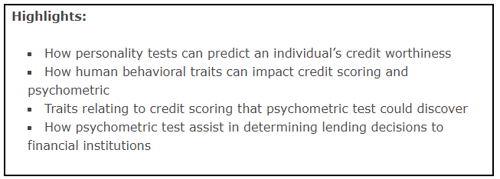Setting The Credit Score With Psychometric Assessment
If you hit an unexpected bounty of Rs. 100,000, what would you do with it? Buy an Apple iPhone X or travel to Bali on a vacation you always desired? Or put it in bank deposits or invest it in mutual funds? Or donate a part of it to an NGO? Or another question could be: do you pay your bills on time? Mark your response from strongly disagree to strongly agree.

We see questions such as these in personality tests and a few times even when applying for jobs. Your responses are used to help understand your personality, attitude, and behaviour using psychometrics, a scientific way of identifying hitherto hidden personality traits of an individual.
And the companies looking to hire the best fit for the role aren’t the only ones interested in psychometrics. The banks and Fintech companies are getting in on it, too. What if, instead of a finance company checking your credit score, it gave you a psychometric personality assessment test?
Can a personality test predict your creditworthiness?
The credit and lending industry heavily depends on reliable information to make accurate lending decisions and manage risks. One of the key sources of this information is credit reports and credit scores from credit information bureaus such as CRIF High Mark.
CRIF High Mark has credit histories of nearly 38 crore Indians. Despite a full data coverage of formal lending channels, credit bureaus with only traditional data sources miss out on data on population, which the formal lenders do not serve. These include unserved or underserved individuals and even small and medium-sized businesses, which tend to be at a disadvantage when they apply for loans due to the scarcity or unavailability of reliable third-party information on them.
Human Behaviour is the central piece in traditional credit scoring and psychometrics:
In the absence of reliable financial data points, a bank or a lender seeks a reason to believe that such a borrower will repay. A traditional credit score predicts the likelihood of loan repayment based on the borrower's past repayment behavioural track record.
Similarly, a psychometric personality test can list the hidden personality and behavioural traits, including the value and belief system of the borrower. Conscientiousness, a trait that psychometric tests for banks help discover, is a strong indicator of willingness to repay. An honest and disciplined person is more likely to repay their loan, assuming the ability to repay is unaffected.
Everyone has a personality:
People who have never availed of credit through formal banking channels will not have a traditional credit score. People who are not on social media and are not using smartphones may not have social credit scores. However, because everyone has a personality, their data is available under psychometrics.
Even for small and medium-sized businesses, the promoter is the real brain and body behind a company. Therefore, the promoter's psychometrics will reflect his value and beliefs, which are likely to drive the way the business operates. The use of psychometrics to measure attitudes, behaviour and personality traits could make information more available, that too at a relatively low cost.
Psychometric tools have been used extensively over the years in recruitment by employers, with strong results – many say that these tests are better predictors than the level of education, employment interview results and reference checks. The results of psychometric tests for banks can help a bank determine whether or not to trust the borrower with the money, just like they do for an employer when considering a potential employee.
What traits can psychometrics discover?
Questions about how many friends you have and whether you make your bed every morning provide a look into your soul. If you answer that you would feel excited about taking a different route to work on other days, it might indicate you are an explorer and are likely to take risks.
Feel quickly frustrated when stuck in traffic? You probably lack patience and, thus, are likely to make hasty decisions.
A psychometric credit assessment involves a series of such questions, and the responses to each of these questions are considered collectively to produce the result. A typical Psychometric Credit Scoring Test is designed to evaluate your personality traits such as self-control, confidence, conscientiousness, responsibility, social desirability and, yes, bed-making acumen.
These personality questionnaires remove the masks of socio-economic background, level of education and other learned behaviour to provide a dive into who you really are – psychometrics is a leveller.
How can psychometrics be used in lending?
Fintech companies and lenders across the globe are trying out psychometric credit scoring, even though it is a relatively new concept for this purpose. Successes in some markets have helped improve access to credit to the previously “unscorable” population without a significant change in the credit risk profile of the portfolios.
Psychometric personality assessment can help lenders extend credit to a growing number of consumers who are new to credit or even new to the bureau, thus triggering the next round of financial inclusion. It can also bring hitherto intangible data at the disposal of lenders for even those consumers who have credit scores available for them in the credit bureau, thus enabling the lender with a more holistic view of the consumer.
Improved credit risk assessment and higher financial inclusion through low-cost easy-to-administer psychometrics tests of the complex streaks of human personality is a worthwhile possibility.
CRIF Highmark
CRIF High Mark is India’s only credit information bureau catering to all borrower segments – MSME and Commercial borrowers, Retail consumers, and Microfinance borrowers. It is the pioneer in building and operating the country’s first and world’s largest Microfinance Bureau Database.
CRIF High Mark provides Analytics, Data Management and related Software solutions promoting a more mature credit culture in the Indian economic system and sustaining the financial needs of businesses and consumers.
Original Source: NewsBarons
